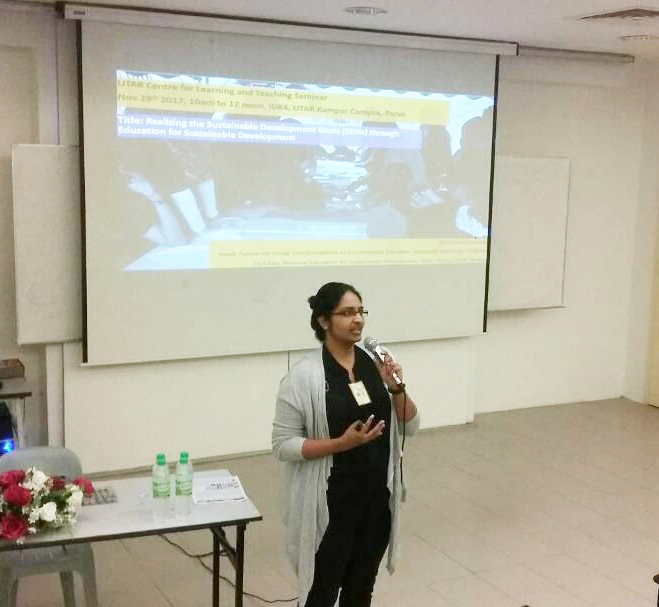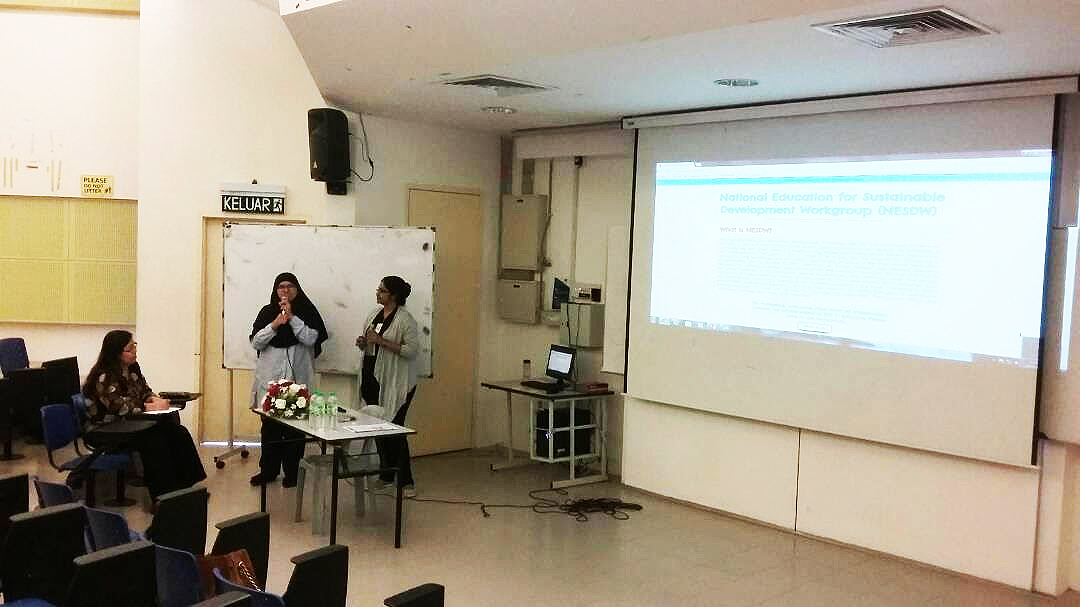

Dr Subarna explaining the concept of sustainability
With emphasis placed on the importance of realising sustainable development goals (SDGs) in local universities, the talk organised by the Centre for Learning and Teaching (CLT) saw invited speaker and senior lecturer from Universiti Teknologi Petronas (UTP) Dr Subarna Sivapalan shared the definition of sustainable development (SD), definition of Education for Sustainable Development (ESD), transitions from Millennium Development Goals (MDGs) to SDGs, efforts of mobilising stakeholders for SDGs locally, and the introduction to projects conducted under the National ESD Work Group (NESDW), on 29 November 2017, at the Kampar Campus.
Present among the participants were also World Wildlife Fund (WWF)’s Senior Manager of Formal Education Nor Shidawati Abdul Rasid, and the organising committee, which consisted of Organising Chairperson Dr Wei Choo Yi, Deputy Organising Chairperson Lau Siew Yee and CLT Chairperson Winnie Er Pek Hoon. The organising committee was assisted by Faculty of Business and Finance (FBF) Deputy Dean for R&D and Postgraduate Programmes Dr Lau Lin Sea and FBF lecturer Dr Tan Ai Lian, whom with their assistance had enabled the talk to be successfully organised.
Titled “Realizing Sustainable Development Goals through Education for Sustainable Development”, the talk aimed to provide participants with insights on the SDGs, and to provide various ideas that the university can do in order to carry out ESD initiatives, which saw participants benefiting from Dr Subarna’s introduction on sustainability.
Dr Subarna, who is also the head of the Centre for Social Transformations and Sustainable Lifestyles in UTP, elucidated to participants that sustainability, according to the World Commission on Environment and Development, is “the ability to meet the needs of the present, without compromising the ability of future generations to meet their own needs”.
On that point, she mentioned, “Sustainability competence is highly valued in the workforce. Students need to have the knowledge on how they contribute to the goals of sustainability. For example, when working in a company, students can help the company by finding ways to save costs or even help develop business strategies that could help make the environment greener.”
Offering participants a clearer understanding, she explained that sustainable development is comprised of four key dimensions, namely social sustainability, economic sustainability, cultural sustainability and environmental sustainability, and that ESD revolves around these dimensions.
According to the speaker, ESD is the umbrella term for education that aims to develop sustainability literate individuals, and ESD is the term commonly used by the United Nations (UN). She then shared to participants the core principle of ESD.
From her explanation, participants understood that ESD is based on the principles and values that underline sustainable development; it deals with the well-being of all four dimensions of sustainability; promotes lifelong learning; it is locally relevant and culturally appropriate.
ESD is also based on local needs, perceptions and conditions but acknowledges that fulfilling local needs often has international effects and consequences. The last principle of ESD shared with the participants was that ESD builds civil capacity for community budget, decision-making, social tolerance, environmental stewardship, an adaptable workforce, and a good quality life.
She also emphasised that ESD efforts are not done alone, but rather through collective efforts ranging from international to local levels.
“UNESCO highlights to us that ESD is about engaging people in sustainable development issues, developing their capacities to give meaning to SD and to contribute to its development, as well as utilising the diversity represented by all people in generating innovative solutions to SD challenges and crises,” explained Dr Subarna.
The 17 SDGs outlined by UN that were shared to participants are as below:
Aware that UTAR also encourages commitment to lifelong learning; Dr Subarna encouraged staff and students present to use that platform as an opportunity to engage in ESD, and to use ESD for researches that would greatly help nearby areas to build a sustainable living. Beginning with simple actions, she gave example such as how to inform food operators in the cafeteria to not sell seafood from the endangered list.
The speaker also complimented the lush greenery of UTAR which she spoke of as being very suitable for developing sustainable environment project, which she also then shared that upon entering UTAR, seeing the large number of bicycles in the premise inspired her to advocate further the green transportation project in UTP.
Under the organisation, WWF Malaysia, Dr Subarna is the Co-Chair of the National Education for Sustainable Development Work Group (NESDW) and the Deputy Chair of the National Eco-Campus Committee.
Nor Shidawati was later invited to share briefly about NESDW and she encouraged UTAR to participate in this group with hope to spread the good efforts of the ESD initiatives.
Tokens of appreciation were later presented to Dr Subarna and Nor Shidawati by Dr Wei.

Nor Shidawati giving an overview of NESDW

From left: Dr Wei presenting tokens of appreciation to Dr Subarna and Nor Shidawati, while Er and Siew Yee looks on
© 2019 UNIVERSITI TUNKU ABDUL RAHMAN DU012(A).
Wholly owned by UTAR Education Foundation Co. No. 578227-M LEGAL STATEMENT TERM OF USAGE PRIVACY NOTICE